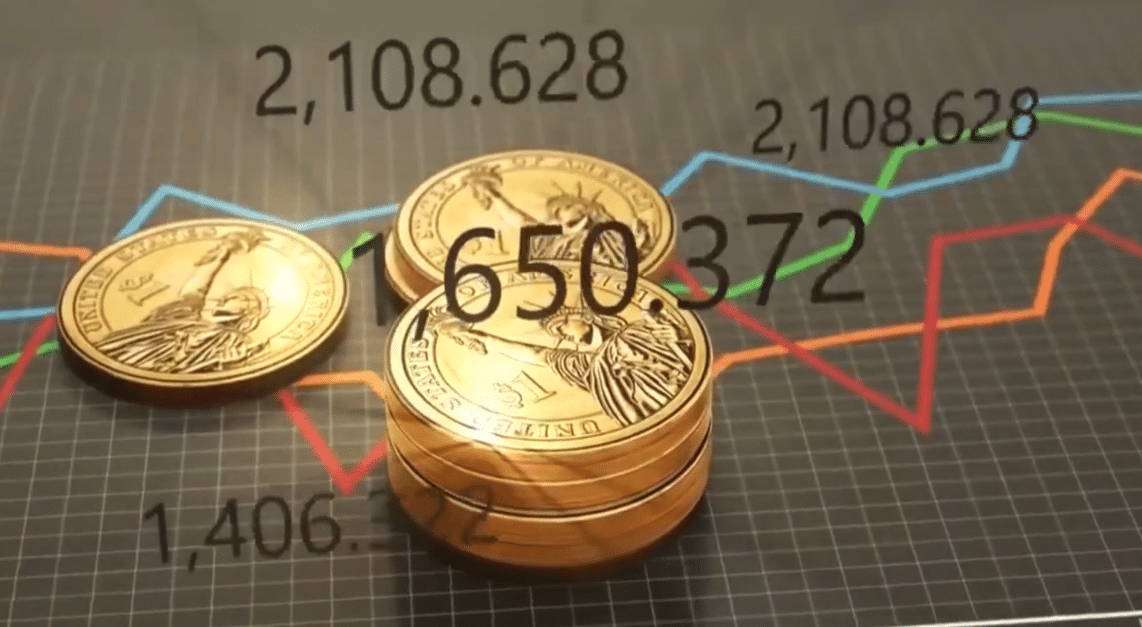How Much Gold Can I Sell Without Reporting?

Ever wondered how to navigate the labyrinth of tax regulations when selling your gold? You're not alone. Many of us are unsure about the reporting requirements and tax implications of selling gold. Now, you might be asking, 'How much gold can I sell without reporting?'
It’s vital to understand the IRS guidelines on this matter to prevent any potential penalties when selling gold. To better how gold can be sold without reporting, we will discuss:
- Is Gold Taxable?
- Do I have to pay taxes if I sell gold?
- How do I avoid capital gains taxes on precious metals like gold and silver?
- How much gold can I sell without reporting?
- Buying and Selling Precious Metals Through a Gold IRA
- The Truth about Precious Metals Reporting
This piece aims to illuminate these complex rules and help you strategize to minimize your tax liability. Let's simplify the complex world of gold selling.
After all, knowledge is your best defense when it comes to tax and legal matters.
Is Gold Taxable?
You might find yourself wondering, 'Is gold taxable?'
The answer is yes, gold is considered a collectible by the IRS and is subject to tax laws similar to those that apply to other valuable items like art or antiques.
It's essential to understand these regulations, as they directly impact what happens when you decide to sell your gold.
Are gold transactions reported to the IRS?
When it comes to selling gold, you'll find that transactions are indeed reported to the IRS and are subject to taxation. This reporting is done on Schedule D of Form 1040 during your next tax return. The tax obligation arises from the capital gains made on the sale of the gold, not at the instant you sell.
Here are a few important points to remember:
- If you sell gold coins worth more than $1,000 within a year, you're required to submit Form 1099-B.
- Transactions involving gold items like U.S. 90% Silver Dimes, and gold coins or bars with more than 50% pure gold content also require reporting.
- Remember, tax laws are complex and can change, so it's always wise to consult a tax professional if you're unsure about your obligations.

Do I have to pay taxes if I sell gold?
If you sell gold and turn a profit, you'll often find yourself asking, 'Do I have to pay taxes?'
The answer is generally yes, as the IRS considers precious metals like gold as capital assets, making your financial gain a taxable income.
Let's explore how you calculate the tax you owe when you sell gold, shedding light on the intricacies of tax obligations related to gold sales.
How to calculate the tax you owe when you sell gold
Calculating the tax you owe from selling gold involves a few key steps, and yes, in most cases, you'll need to pay taxes on the sale. Initially, you'll need to determine the fair market value (FMV) of your gold at the time of sale. Subtract the price you originally paid for the gold from the FMV to get your capital gain. Here's how that might work:
- If you bought a gold chain for $100 and sold it for $200, your capital gain is $100.
- If you received gold as a gift or inheritance, use the FMV at the time you received it as your cost basis.
- You'll then owe taxes on this gain, with the rate maxing out at 28% depending on your income bracket and how long you've had the gold.

How Do I Avoid Capital Gains Taxes on Precious Metals like Gold and Silver?
Wondering how to sidestep capital gains taxes on your gold or silver?
One strategy is a 1031 exchange, a method typically used in real estate, which allows you to defer paying taxes by reinvesting the profits from your sale into more precious metals.
Another option is to trade metals through a self-directed Roth retirement account, which offers tax-free growth of your investments, although it does come with specific rules and restrictions.
Use a 1031 Exchange
Often, you can significantly reduce your capital gains taxes on precious metals like gold and silver by utilizing a strategy known as a 1031 exchange. This involves reinvesting the proceeds from your gold sale into buying more gold, enabling you to postpone your tax bill.
The IRS has specific requirements for this exchange:
- The gold you purchase must be of a similar kind to the one you sold.
- You must identify the replacement property within 45 days of the sale.
- You must close on the new property within 180 days of the sale.
Remember, you only pay taxes when you sell your gold for cash, not when you use the proceeds to buy more gold.
Always consult with a tax professional to ensure you meet all the IRS requirements for a 1031 exchange.
Self-Directed Roth Retirement Accounts
You might be thinking, 'How can I avoid capital gains taxes on precious metals like gold and silver?' One smart way is through self-directed Roth retirement accounts. By selling gold through these accounts, the value of your assets grows tax-free.
However, it's crucial to follow certain rules to avoid IRS scrutiny. Firstly, the gold must be pure, like Gold Mexican Onza coins or Maple leaf gold. Secondly, don't lend money to yourself or any dependents from these accounts.
Be vigilant about these rules and consult a financial advisor if needed. This strategy, if executed correctly, allows you to sell gold without incurring capital gains tax, making it a savvy method for gold transactions.
How Much Gold Can I Sell Without Reporting?
You may be wondering, 'How much gold can I sell without reporting?'
It's crucial to understand that transactions involving certain types and quantities of gold require reporting to the IRS.
Let's examine the specifics of this, focusing on the tax implications and reporting thresholds for selling gold.
Taxes and Limits on Selling Precious Metals
While you might be eager to profit from your gold investments, it's crucial to understand the tax implications and reporting requirements that come with selling precious metals. Any gains from the sale of your gold are subject to capital gains tax, and the rate depends on how long you've held the asset. Short-term gains are taxed at your regular income rate, while long-term gains benefit from a lower rate.
Also, remember that selling precious metals doesn't always require reporting to the IRS. Factors influencing this include:
- The type of product sold
- The weight of the product
- The value of the transaction
However, certain items like American Gold Eagle Coins, numismatic, and semi-numismatic coins don't require a Form 1099-B at all.
Buying and Selling Precious Metals Through a Gold IRA
Gold IRAs provide additional advantages to merely buying gold from a local dealer. Furthermore, these companies can provide serious gold investors access to competitive prices, transparency, a sound buyback policy, reliable customer service, and robust security protection of their precious metal investments.
Choosing the right gold IRA company will depend on one's unique investing needs. Depending on whether you are a high-net investor looking for the most competitive prices or require a lower investment minimum and affordable entry to the gold market, we have researched and reviewed our best 4 gold IRA and precious metal investment companies that meet those individual needs. In addition to a gold IRA, owning the physical gold in your place of residence is also an option. We have provided links to these companies at the bottom of this article for your convenience.
Tap the banner below to visit Birch Gold Group to receive their gold IRA guide:
The Truth about Precious Metals Reporting
When it comes to selling precious metals, you must understand the reporting requirements.
Let's uncover the truth about reportable purchases, related transactions, bank reporting, and reportable sales.
These areas can impact your obligations to the IRS and shape your strategy when selling gold or other precious metals.
Reportable Purchases
Let's debunk some misconceptions about precious metals reporting; it's not the gold or silver you're buying or selling that the government wants reported, but rather the cash transactions exceeding $10,000. If you pay in paper money, and it's over this threshold, that's when the IRS requires a Form 8300.
Personal checks, wire transfers, or money market withdrawals aren't considered cash and thus, not reportable.
Cashier's checks or money orders can trigger cash reporting, but only when they're less than $10,000 individually, yet total over $10,000 for a single purchase.
If you're conducting transactions within a 24-hour period, and they're related, this also falls into the reportable category.
Related Transactions
You might be wondering about the specifics of related transactions and how they affect precious metals reporting. Here's the truth: Form 8300's General Instructions stipulate that transactions are related, even if they occur over more than 24 hours, as long as the recipient knows or has reason to know that each transaction is part of a series of connected transactions.
For instance, if you agree to buy $20,000 in gold but make installment payments with cash in amounts less than $10,000, it's still reportable. It's crucial to understand that such tactics to avoid reporting requirements don't work.
Bank Reporting
It's important to know the real facts about bank reporting when it comes to selling your gold. Contrary to popular belief, banks don't report personal checks above $10,000 to the government. However, cash transactions exceeding that amount do require a Cash Transaction Report (CTR). Additionally, purchasing cashier's checks with cash for amounts between $3,000 and $10,000 mandates banks to complete Monetary Instrument Reports (MIRs).
Here's what you need to know:
- Cash transactions over $10,000 require a CTR.
- Purchases of cashier's checks with cash between $3,000 and $10,000 need a MIR.
- Regularly purchasing cashier's checks within the specified range may trigger reporting.
Stay informed, and don't let fear of reporting lead you into overpriced deals.
Reportable Sales
Now that we've covered bank reporting, let's delve into the truth about precious metals reporting and what sales are reportable.
Selling certain precious metals in specific quantities to dealers triggers reporting to the IRS on Form 1099B. Reportable sales include 1-oz Gold Maple Leafs, 1-oz Krugerrands, and 1-oz Mexican Onzas sold in quantities of 25 or more in a single transaction. However, American Gold Eagles and any fractional-ounce gold coins are exempt, regardless of quantity.
For silver, pre-1965 U.S. coins are reportable, though the exact quantity that triggers a 1099B is ambiguous. Sales of American Silver Eagles, privately-minted Silver Eagles, and 100-oz silver bars aren't reportable, irrespective of the quantity.
To avoid reportable sales, consider purchasing American Eagles.
Conclusion
So, here's the bottom line: Gold sales may be taxable, and skirting reporting requirements isn't worth the risk.
Even though selling small amounts isn't likely to raise flags, it's best to stay informed about IRS rules.
Remember, minimizing taxes on gold sales is possible with strategic planning.
Always consult a tax professional to navigate this complex territory, ensuring you're both legally compliant and financially savvy.
After all, knowledge is your most valuable asset.
Obtain a gold IRA guide and talk to a broker




If you have 100k in savings to protect, attend a gold investment educational webinar hosted by Augusta Precious Metals. Tap the button below:
Gold IRA FAQs

Adam ONeill
Author, lifelong investor, and creator of PreciousMetalsInvestmentPortfolio.com

